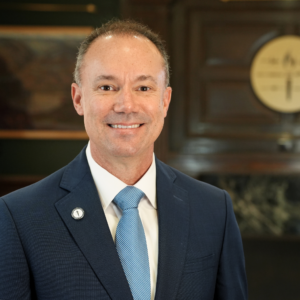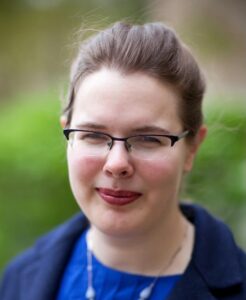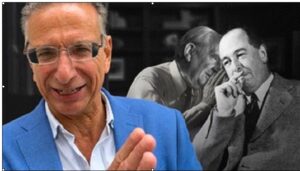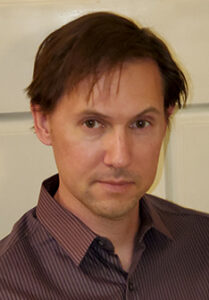When I was ten, I read fairy tales in secret. Now that I am fifty, I read them openly. When I became a man I put away childish things, including the fear of childishness.

LOGOS Newsletter of the C. S. Lewis Society of California Spring 2025
— C.S. Lewis , On Stories
[Comment from Christopher King, Silicon Valley attorney, software virtuoso, and Lewis Society board member: “I’ve always found the assumption that children’s literature is of less value than ‘adult’ literature to indicate a lack of reflection!” See section 4 below, for more favorite quotes and commentary.]
In This Issue:
-
- Eric Patterson speaks on “C. S. Lewis on Totalitarianism,” in person in Oakland April 16, 2025.
- Is the intellectual tide turning? – a recent spate of articles on sophisticated thinkers abandoning atheism and secularism for Christianity.
- Why are young men turning to God more than ever—and more than women?
- NEW Joseph Loconte YouTube channel on C. S. Lewis and western civilization!
- “My Favorite Lewis Quotes, and Why,” by Christopher King, board member.
- “Mere Economics”: new book on economic freedom by Christian economists.
- Can patriotism be godly? C. S. Lewis explains how.
- Subscribe FREE to the YouTube Channel of the C.S. Lewis Society!
- Join with us as a Member of the C.S. Lewis Society and Receive a FREE book or video.
- Parting thought.
1. Eric Patterson speaks on “C. S. Lewis on Totalitarianism,” in person in Oakland April 16, 2025

On April 16, 2025, Eric Patterson,Ph.D., President of the Victims of Communism Memorial Foundation in Washington, D.C., paid an in-person visit to the C. S. Lewis Society of California, presenting a program titled “Beware the Marxomanni! C.S. Lewis on Totalitarianism”
From Eric Patterson: “Lewis lived and wrote during a time of dramatic ideological competition, with the rise of totalizing ideologies in the Soviet Union (Marxist-Leninist communism), Italy (Mussolini’s fascism), and Germany (National Socialism-Nazism), not to mention forms of nationalized racial supremacy that informed Nazism (Aryan supremacy) and the violent ideology of Imperial Japan. This essay is part of a larger project of Lewis’s thinking on war, peace, justice, and security. I focus attention specifically on some of the things that Lewis wrote regarding revolutionary ideologies and violence, imperialism, and totalitarianism during a critical period, primarily from about 1933-1945. At the time, Lewis was a relatively young scholar (he turned thirty in 1928) and yet, by as early as 1933 he described in his fiction the Nietzschean ethos of struggle and conquest of both communism and fascism, labeling them in his The Pilgrim’s Regress as violent dwarves known as the Marxomanni, Swastici, and Fascisti.
“Lewis was famously apolitical, even respectfully dodging a knighthood lest it suggest that he was a partisan of the party then in power in Westminster. Moreover, he did not write at any length, from the vantage point of a scholar, about the deep theoretical or philosophical underpinnings of these ideologies, despite the fact that they were the great ideational and security challenges to Western civilization.
“Yet he thoughtfully exposed their evils, both in terms of ideas and tactics, in his fiction. We will see that Lewis recognized in these ideologies a false and anti-Christian view of human nature—a view which therefore had no regard for the worth and dignity of the individual human being. We will also see that Lewis recognized that the accretion of power and the willingness to use every tool of the state, including misinformation, propaganda, torture, and war, was a sin inherent to ideologies emanating from Moscow and Berlin. Finally, we will see how Lewis levels a Christian and liberal (democratic, human rights-oriented) critique at revolutionary violence and totalitarianism, particularly in the novels of his Space Trilogy.”
Eric Patterson, Ph.D. serves as President and CEO of the Victims of Communism Museum in Washington, DC and is Past President of the Religious Freedom Institute. As a scholar, his focus has been on the intersection of ideas (culture, religion, ideology) and national security affairs. Patterson is the author or editor of over twenty books, dozens of academic articles, and op-eds and interviews in many popular publications. Among his current projects is a book on C.S. Lewis’ writings on war, peace, and security, from Lewis’s early poetry to his academic work on Arthur and chivalry to Lewis’ fiction and apologetic works.
A video recording of Eric Patterson’s presentation to the Society, and the ensuing discussion, will be posted to our YouTube channel (on which more below).
2. Sarah Coogan shared her “Great C. S. Lewis Re-Read,” in Oakland March 12, 2025.

In January of 2024, Sarah Coogan (Ph.D., English, University of Notre Dame) set out to re-read all of C. S. Lewis’ published works in chronological order over the course of one year and shared her thoughts on them weekly in her popular Substack ). The result was the “Great C. S. Lewis Re-Read, or, the Undragoning of My Imagination,” which Dr. Coogan discussed in person with our Bay Area Book and Film Club on March 12, 2025.
In her introductory Substack post, Dr. Coogan explained that having read all of Lewis, having studied him as an academic, including writing her honor’s thesis on Lewis, she had become “territorial about Lewis—arrogant, defensive of my intellectual commitment and emotional attachment—and at times I’ve over-fixated on those bona fides.”
And so, she felt the need of “an intellectual undragoning. Of course, the undragoning of Eustace Clarence Scrubb is an image of regeneration and sanctification—and we all of us need that! But I also need my arrogance and fear stripped away, that I might approach the intellectual life, and in particular these much-loved texts, with fresh eyes and soft hands.” Her goal was to again “read with the child’s wonder and joy in the presence of beauty.”
Here’s how C. S. Lewis put it in his dedication to The Lion, the Witch and the Wardrobe:
My Dear Lucy,
I wrote this story for you, but when I began it I had not realized that girls grow quicker than books. As a result you are already too old for fairy tales, and by the time it is printed and bound you will be older still. But some day you will be old enough to start reading fairy tales again. You can then take it down from some upper shelf, dust it, and tell me what you think of it. I shall probably be too deaf to hear, and too old to understand a word you say but I shall still be
your affectionate Godfather, C. S. Lewis
As Dr. Coogan shared highlights with us from her “Great C. S. Lewis Re-Read,” she commented: “I hope that I have never been entirely ‘too old for fairy tales.’ But I am certainly old enough to start reading them again.”
For a listing of the books read, in chronological order, see: https: //sarahcoogan.net/the-great-c-s-lewis-re-read
A video recording of Sarah Coogan’s presentation to the Society, and the ensuing discussion, will be posted to our YouTube channel (on which more below).
3. Is the intellectual tide turning? – a recent spate of articles on sophisticated thinkers abandoning atheism and secularism for Christianity.
A surprising cohort of formerly secularist public intellectuals have begun to reverse course on Christianity, or even to embrace it, as the articles below indicate. Influential writers as varied as A.N. Wilson, Jordan Peterson, Peter Thiel, and Ayaan Ali Hirsi seem now to judge that our civilizational abandonment of the Christian faith was a mistake. C. S. Lewis would, no doubt, be heartened. Indeed, it seems likely that his books helped lay the groundwork for this reconsideration.
But what is the meaning of this shift? Are these thinkers claiming that Christianity is true, or that it is useful?—useful, it would seem, for the sustainability of Western Civilization? The trouble is, if you embrace Christianity for its civilizational utility, you thereby drain it of the utility for whose sake you embraced it. Think about it: in order for the Christian faith to have civilizational utility, which these writers so accurately perceive it to have, it must be embraced by a critical mass of people in a society; and most of those people must embrace it for its truth rather than for its utility. If it’s just useful for the group, but not really true or morally imperative, there’s no reason to submit yourself to its disciplines when it is inconvenient to do so or downright contrary to your own desires and self-interest. Thus the civilizational utility argument undermines itself in practice.
But I think I detect a deeper and more profound shift toward God in many of these thinkers as they work out their own reasons for giving Him another look. Are some of them coming to recognize that Christianity can be both useful and true? The articles below, documenting these trends, seem worth our attention. (I’ve provided an excerpt from each article, but you must go to the original site for the content in its entirety.)
— Graham Walker, President, C. S. Lewis Society of California
How Intellectuals Found God. Almost 150 years after Nietzsche said ‘God is dead,’ some of our most important thinkers are getting religion. Peter Savodnik meets the new theists.
By Peter Savodnik. The Free Press, December 28, 2024
In the beginning, Matthew Crawford believed in nothing. “The question of God wasn’t even on the radar,” the best-selling author told me. …In the 1990s, he was a graduate student at The University of Chicago, where he studied Greek philosophy and embraced his agnosticism—“the preferred position of modern people,” he said, half-jokingly. “I was impressed, as a young man, with Nietzsche’s critique of Christianity,” he said. The German philosopher saw religion as little more than a “slave morality”—a crutch for the weak and cowardly. But then, in 2016…. [Read the rest of the article here at The Free Press: https://www.thefp.com/p/how-intellectuals-found-god-ayaan-hirsi-ali-peter-thiel-jordan-peterson ]
A Christian Revival Is Underway
By Ayaan Hirsi Ali, The Spectator (U.K.), December 14, 2024
This is my second Christmas as a Christian. As an atheist, I had dismissed the bright lights and customs of Christmas as traditions that had evolved to keep our spirits up as the cold of winter creeps in. But the more I learn about, and participate in, the rituals of my adopted faith, the less Grinch-like I become. Christmas isn’t just crass commercialism, it’s vital to a western revival…. Atheists would say…Christianity is just one among many competing superstitions. But just because Christianity has its roots in our political and philosophical traditions doesn’t make it false…. [Read the rest of the article here at The Spectator: https://www.spectator.co.uk/article/a-christian-revival-is-under-way/ ]
Some of Christianity’s Biggest Skeptics Are Becoming Vocal Converts
By Nathan Guy, Christianity Today, September 2024
I am talking about the growing number of “intellectual Christians”—people whose turn to faith is tethered far more to cognitive knowledge than to subjective experience. The general cultural trend on the ground is still shifting away from Christianity—most easily recognized by the exponential rise of the “nones.” But a curious trend is taking place among the elite, as a growing number of high-profile thought leaders and public figures are repudiating their antireligious paradigms in favor of the Christian framework. Consider, for example, A. N. Wilson, an Oxford graduate and former classmate of Richard Dawkins who had developed a reputation as a cerebral writer with a bone to pick with believers. The self-described atheist shared his misgivings in his 1991 book Against Religion: Why We Should Try to Live Without It. But in 2009, Wilson shocked his friends and colleagues by penning a New Statesman article titled…. [Read the rest of the article here at Christianity Today:
https://www.christianitytoday.com/2024/09/christianity-biggest-skeptics-becoming-vocal-converts/ ]
4. Why are young men turning to God more than ever—and more than women?
In a First Among Christians, Young Men Are More Religious Than Young Women
By Ruth Graham, New York Times, September 25, 2024
For the first time in modern American history, young men are now more religious than their female peers. They attend services more often and are more likely to identify as religious. “We’ve never seen it before,” Ryan Burge, an associate professor of political science at Eastern Illinois University, said of the flip. Among Generation Z Christians, this dynamic is playing out in a stark way: The men are staying in church…. [Read the rest of the article here at New York Times: https://www.nytimes.com/2024/09/23/us/young-men-religion-gen-z.html ]
Young men leaving traditional churches for ‘masculine’ Orthodox Christianity in droves
By Rikki Schlott, New York Post, December 3, 2024
Ben Christenson…watched as traditions went by the wayside: The robed choir was swapped out for a worship band, lines were blurred on female ordination, and long-held stances on LGBT issues shifted. “All of that stuff was basically fungible, which gave me a sense that the theological commitments are kind of fungible, too,” he said. So Christenson began exploring other denominations in college and landed on perhaps the most traditional of all: Orthodox Christianity. In 2022, at the age of 25…. [Read the rest of the article here at New York Post: https://nypost.com/2024/12/03/us-news/young-men-are-converting-to-orthodox-christianity-in-droves/]
5. NEW Joseph Loconte YouTube channel on C. S. Lewis and western civilization!

Friend of the Lewis Society Joseph Loconte has a new YouTube Channel—including the start of a documentary series on C.S. Lewis and J.R.R. Tolkien, based on his forthcoming book THE WAR FOR MIDDLE-EARTH: J.R.R. Tolkien and C. S. Lewis Confront the Gathering Storm, 1933-1945. See also the “Gift of the Italians” videos, telling the story of Western Civilization (and the American political order) in a way that draws people’s hearts and minds to transcendent truths.
Friend of the Lewis Society Joseph Loconte has a new YouTube Channel—including the start of a documentary series on C.S. Lewis and J.R.R. Tolkien, based on his forthcoming book THE WAR FOR MIDDLE-EARTH: J.R.R. Tolkien and C. S. Lewis Confront the Gathering Storm, 1933-1945. See also the “Gift of the Italians” videos, telling the story of Western Civilization (and the American political order) in a way that draws people’s hearts and minds to transcendent truths.
Check it out: https://www.youtube.com/@JoeLoconte
6. “My Favorite Lewis Quotes, and Why,” by Christopher King, board member
 Christopher King is a Silicon Valley patent attorney, software virtuoso, and Lewis Society board member who agreed to share with us his favorite Lewis quotes, and his comments. (See his first favorite quote at the top of this Newsletter!) During the 2025 year, Christopher is serving as a discussion leader in our Bay Area Book and Film Club for The Great Divorce by C. S. Lewis (February 12 and 26), and for The Dean’s Watch by Elizabeth Goudge (April 23 and May 7).
Christopher King is a Silicon Valley patent attorney, software virtuoso, and Lewis Society board member who agreed to share with us his favorite Lewis quotes, and his comments. (See his first favorite quote at the top of this Newsletter!) During the 2025 year, Christopher is serving as a discussion leader in our Bay Area Book and Film Club for The Great Divorce by C. S. Lewis (February 12 and 26), and for The Dean’s Watch by Elizabeth Goudge (April 23 and May 7).
“We do not merely want to see beauty, though, God knows, even that is bounty enough. We want something else which can hardly be put into words—to be united with the beauty we see, to pass into it, to receive it into ourselves, to bathe in it, to become part of it.…At present we are on the outside of the world, the wrong side of the door. We discern the freshness and purity of morning, but they do not make us fresh and pure. We cannot mingle with the splendours that we see. But all the leaves of the New Testament are rustling with the rumour that it will not always be so.”
— C. S. Lewis, “The Weight of Glory”
Christopher’s comment: The concept of “joy” (discussed at greatest length, of course, in Surprised by Joy) runs through much of C.S. Lewis’s work and is of all of his ideas the one that is most important to me.
“He knew why they were laughing and joined in the laugh himself. But very quickly they all became grave again: for, as you know, there is a kind of happiness and wonder that makes you serious. It is too good to waste on jokes.”
— C.S. Lewis , The Last Battle, “Further Up and Further In”
Christopher’s comment: Humor is a wonderful experience, and even more when shared with beloved ones. But even that melts away when the greatest comes.
“Then he breathed upon me and took away the trembling from my limbs and caused me to stand upon my feet. And after that, he said not much but that we should meet again, and I must go further up and further in. Then he turned him about in a storm and flurry of gold and was gone suddenly. And since then, O Kings and Ladies, I have been wandering to find him and my happiness is so great that it even weakens me like a wound.”
— C.S. Lewis , The Last Battle, “Further Up and Further In”
Christopher’s comment: “All who seek, find…”
“That dust which is scattered so rare in Heaven, whereof all worlds, and the bodies that are not worlds, are made, is at the centre. It waits not till created eyes have seen it or hands handled it, to be in itself a strength and splendor of Maleldil. Only the least part has served, or ever shall, a beast, a man, or a god. But always, and beyond all distances, before they came and after they are gone and where they never come, it is what it is and utters the heart of the Holy One with its own voice. It is farthest from Him of all things, for it has no life, nor sense, nor reason; it is nearest to Him of all things for without intervening soul, as sparks fly out of fire, He utters in each grain of it the unmixed image of His energy. Each grain, if it spoke, would say, I am at the centre; for me all things were made. Let no mouth open to gainsay it. Blessed be He!”
— C.S. Lewis , Perelandra, Chapter 17
Christopher’s comment: “The Great Dance” is arguably the greatest passage that Lewis wrote.
“How should man live save as glass
To let the white light without flame, the Father, pass
Unstained”
— C.S. Lewis , “Wormwood”
Christopher’s comment: For many years I’ve thought that a sort of transparency (a quality of humility) is something that only a few people manage to achieve, and usually not until they are very old. (“A man without guile”—without even any inauthenticity.)
7. “Mere Economics”: new book on economic freedom by Christian economists
Mere Economics
By Caleb S. Fuller and Art Carden
Broadman and Holman Academic, publication April 1, 2025
You can tell by the title that this book, by Caleb Fuller (Grove City College) and Art Carden (Samford University), was written with C. S. Lewis in mind. These Economics professors, who are also Christians, do more than simply discuss the realities of economic theory. As the book’s Amazon page comments, “They highlight the Christian case for one’s involvement in the economy. Mere Economics points to the basic principles of economic theory with a tone that is conversational and inviting, with the hope that the everyday Christian will not only discover helpful insight into the world of economics, but will find within it the call for responsibility and stewardship.” Fuller and Carden are well-equipped to explain economic freedom, and exposit its moral and theological credentials.
The C. S. Lewis Society of California hopes to bring these authors to Oakland for an in-person presentation in August 2025!
8. Can patriotism be godly? C. S. Lewis explains how.
“C. S. Lewis on Patriotism”
By Daniel B. Klein, Independent Institute, March 5, 2025
To explore the good and bad of patriotism, Lewis considers several ingredients, including love of home, love of our country’s past, and a nationalistic feeling of superiority. That feeling of superiority especially leads to the poisoning of patriotism, often by swelling to claims of duties and rights. Lewis helps us whittle away inordinate claims… [Read the rest of the article at Independent Institute here: https://blog.independent.org/2025/03/05/c-s-lewis-on-patriotism/ ]
9. Subscribe FREE to the YouTube Channel of the C.S. Lewis Society!
Our YouTube channel features over 280 excellent videos organized into twenty-one Playlists by topic. Our Channel also includes 38 original C. S. Lewis Society videos, including these three most-watched videos: The City of God (146,000+ views), Is Atheism Dead with Eric Metaxas (60,000+ views), and C.S. Lewis on Mere Liberty and the Evils of Statism (31,000+ views). There are more videos coming!



Subscribe FREE to the C. S. Lewis Society’s YouTube channel and receive notices of new videos.
10. Join with us as a Member of the C. S. Lewis Society with a tax-deductible contribution and receive a FREE book or video! See www.lewissociety.org for more details
11. Parting thought:
“I think that if God forgives us, we must forgive ourselves. Otherwise it is almost like setting up ourselves as a higher tribunal than Him.”
— C.S. Lewis , Letters (9 April 1951)
LOGOS is the newsletter of the C. S. Lewis Society of California.
